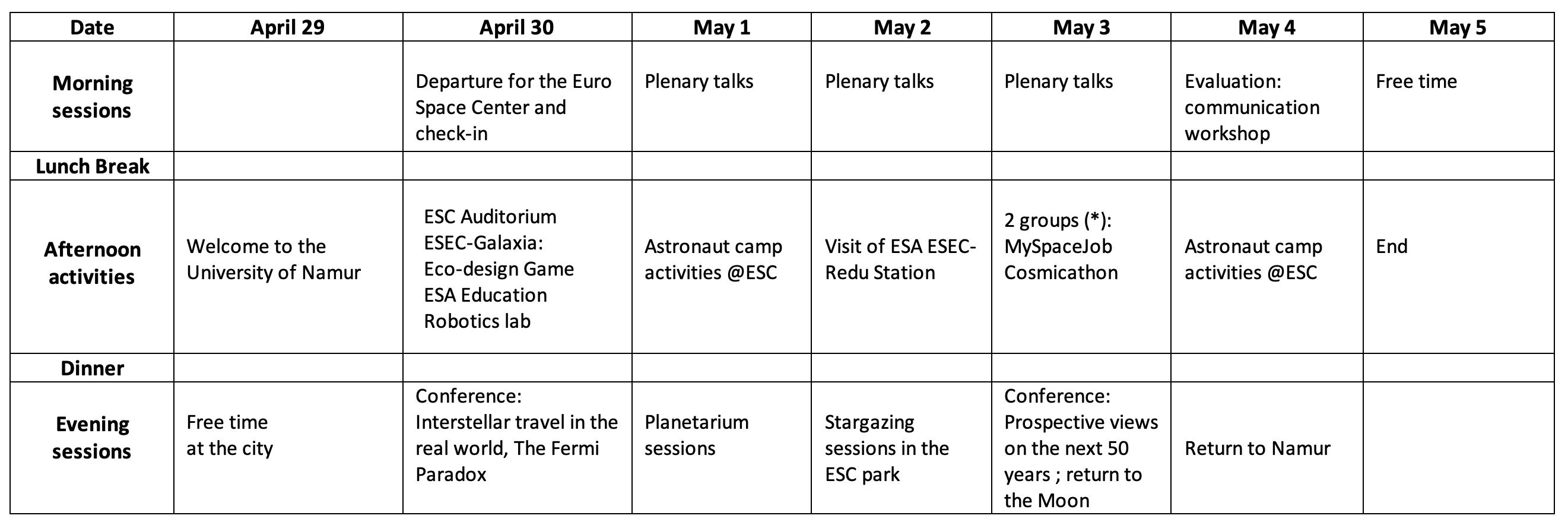Information
- From 29 April to 5 May 2024 in Euro Space Center, Belgium.
- Please contact your home university student mobility administration for registration.
- Accomodation will be booked for you.
ECTS Credits : 3
We propose the students to discover several aspects of the space sector, from engineering and science to humanities, during a Spring School at Euro Space Center and ESA-ESEC (European Space Security and Education Centre), Belgium. The school is oriented towards a large audience, gathering STEM or non-STEM students, to allow them to discover some of the many faces of the space sector. The Spring School will be given in English. For external students that are not following the astronomy lecture (SMAT B213), preliminary online events will be provided for settling the context and some basic scientific knowledge about space. The Spring School will include plenary general conferences on various topics (space law, medicine, rocketry, satellite operations, cybersecurity, etc.), team-building activities inspired by astronaut training at the Euro Space Center (the only space-themed park in Europe), visits of the ESA Academy facilities and ESEC-Redu station, a cosmicathon (team-based challenge around space mission design), planetarium and stargazing sessions, etc.
3 preliminary online activities:
- Mid-March 2024: Introduction to structure of the Universe; remote observations from our teaching astronomical facility.
- End of March 2024: “Space is all around us: why space matters in everyday life”. Introductive conference on the many things that we inherited from space exploration, from GPS to emergency blankets.
- April 2024: Preparation of the mobility: online group discussion and brainstorming about some space hot topics (space debris ; asteroid mining ; space and security ; etc.). These topics will be proposed in the cosmicathon activity during the school (space mission preliminiary design).
Guest speakers
- André Füzfa (UNamur): Why Making Such Ado About Space?, Basics of Astrodynamics.
- Myrka Zago (Uni Roma Tor Vergata).
- Sarah Baatout (SCK-CEN): Exploring the final frontier: Navigating challenges and advancements in Space health.
- Natacha Callens (ESA Education): Early careers and opportunities @ESA.
- Mahulena Hofmann (Uni.lu): Is space a law-free room?.
- Marc Toussaint (ESA): Space and launchers.
- Alix De Beusscher (Aerospace lab): System Engineering: Challenges of designing and operating satellites in the harsh space environment.
- Jérôme Daquin (UNamur): Space debris.
- Anne-Sophie Libert (UNamur): Exoplanets and search for extraterrestrial life.
- Jacques Arnould (CNES): The challenges of Space Ethics.
- Louise Charlier (ULB): Preservation programme of space imaginaries.
- Jean-Luc Trullemans (ESEC-Redu): Cybersecurity and space activities.
- Michelle Baker (ESA-ESOC): Space strategy and policies.
- Christophe Ringeval (UCLouvain): Cosmology with space-based observatories.
- Ils Reusen (Vito): Space to watch the Earth.
- Xavier Pasco (Fondation pour la recherche stratégique): The dynamics of New Space.
Provisional programme

MySpaceJob (May 3 afternoon):
MySpaceJob is an on-line adventure in which you have to follow a fictional journey to discover various jobs through the interviews of real-life space professionals. In this workshop, the students will be invited to go through the platform as an introduction before meeting and discussing with space professionals (plenary speakers, members of ESA Education and ESEC-Redu, special guests, etc.) about their experience, vision and careers.
Cosmicathon (May 3 afternoon):
The students will be affected to a multidisciplinary team gathering different specializations and skills. They will be given a few guidelines about a space mission to design (possibly one per team), and they will have an afternoon to brainstorm about the pertinence, feasibility, costs, schedule, resources, etc. Guest speakers and space professionals will be available (possibly remotely) to share their experience to the brainstormers and give them advice and feedback on their ideas. They will also have to present their conclusions to the other participants at the end of the day.
Evaluations
The Spring School will be preceded by an online meeting event, including some general introductory topics to space sector activities and remote demonstration of our astronomical pedagogical facility in Namur. Evaluation will consist of preparing short articles and/or videos, individually or in teams, aimed at correctly presenting one topic of the conference to a non-specialized audience. Quiz on general culture about space will also be proposed to help the students evaluating their knowledge of the subject.